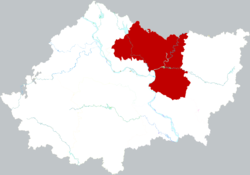Xiangzhou District, Xiangyang
Xiangzhou
襄州区 | |
|---|---|
District | |
 Location in Xiangyang | |
 Xiangzhou Location in Hubei | |
| Coordinates: 32°05′14″N 112°12′43″E / 32.08722°N 112.21194°ECoordinates: 32°05′14″N 112°12′43″E / 32.08722°N 112.21194°E | |
| Country | People's Republic of China |
| Province | Hubei |
| Prefecture-level city | Xiangyang |
| Area | |
| • Total | 2,306 km2 (890 sq mi) |
| Population (2010)[2] | |
| • Total | 904,957 |
| • Density | 390/km2 (1,000/sq mi) |
| Time zone | UTC+8 (China Standard) |
| Website | hbxy |
| Xiangzhou | |||
|---|---|---|---|
| Chinese | 襄州 | ||
| |||
| Xiangyang (the former city) | |||
|---|---|---|---|
| Traditional Chinese | 襄陽 | ||
| Simplified Chinese | 襄阳 | ||
| Postal | Siangyang | ||
| |||
Xiangzhou District (simplified Chinese: 襄州区; traditional Chinese: 襄州區; pinyin: Xiāngzhōu Qū) is a district of the city of Xiangyang, Hubei, People's Republic of China. The district itself was formerly known as Xiangyang (襄阳区). It was a city famous for the siege of Xiangyang (1267–1273) by invading forces of the Mongol-founded Yuan Dynasty. It was also an important city during the period of the Three Kingdoms, in the Romance of the Three Kingdoms it was said that it was nearby Xiangyang that Zhuge Liang received his three visits from Liu Bei. Xiangyang was also where Sun Jian fought Liu Biao in 191 AD during the Three Kingdoms.[citation needed] Today, Xiangzhou has been incorporated with nearby Fancheng to form the prefecture-level city of Xiangyang, part of Hubei province.
Administrative divisions[]
Towns:
Transportation[]
Xiangyang East railway station is located in the district and is an interchange between multiple high-speed lines.
See also[]
References[]
- ^ Jump up to: a b 襄州概况 [Overview of Xiangzhou] (in Chinese). Xianyang People's Government. 1 June 2017. Retrieved 17 September 2018.
2016年末,辖肖湾街道、六两河街道、张湾街道、刘集街道、龙王镇、石桥镇、伙牌镇、黄集镇、古驿镇、朱集镇、程河镇、双沟镇、张家集镇、黄龙镇、峪山镇、东津镇、米庄镇。{...}全区总面积为2306平方千米,
- ^ Jump up to: a b 襄州区历史沿革 [Xiangzhou District Historical Development] (in Chinese). XZQH.org. 6 August 2014. Retrieved 17 September 2018.
1996年,襄阳县面积3232平方千米,{...}2010年,国务院批准同意襄樊市更名为襄阳市,襄阳区更名为襄州区。 2010年第六次人口普查,襄阳区常住总人口904957人,其中:张湾镇156631人,龙王镇53636人,石桥镇70131人,黄集镇69289人,伙牌镇50976人,古驿镇63950人,朱集镇63164人,程河镇56993人,双沟镇84352人,张家集镇50366人,黄龙镇41111人,峪山镇48570人,东津镇95788人。
- ^ 2017年统计用区划代码和城乡划分代码:襄州区 [2017 Statistical Area Numbers and Rural-Urban Area Numbers: Xiangzhou District]. National Bureau of Statistics of the People's Republic of China. 2017. Retrieved 17 September 2018.
统计用区划代码 名称 420607001000 张湾办事处 420607002000 刘集办事处 420607003000 肖湾办事处 420607004000 六两河街道办事处 420607100000 龙王镇 420607101000 石桥镇 420607102000 黄集镇 420607103000 伙牌镇 420607104000 古驿镇 420607105000 朱集镇 420607106000 程河镇 420607107000 双沟镇 420607108000 张家集镇 420607109000 黄龙镇 420607110000 峪山镇 420607111000 东津镇 420607402000 鹿门风景名胜区 420607500000 襄北农场 420607570000 深圳工业园
External links[]
- Ancient Chinese cities
- Xiangyang
- Hubei geography stubs

